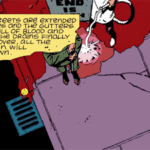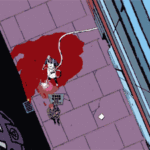Stab Stab Stabby Stab
You may not be able to tell, but this particular piece is on writing stab wounds.
Stabbing is penetration with a sharp or pointed object, like a knife. It differs from slashing by the way that it goes in, not across.
Human beings, believe it or not, generally try to avoid being stabbed. This means that we have certain instincts to try to stop the stabbing itself, which involve putting our hands and arms in the way.
But if you read about a stabbing, most people tend to die. On the other end of the spectrum, they jump up, grimace, and go, “I’ll be okay. I’ll get the bastard back.” And then pull the knife out and go for broke.
So here’s some advice on how to write a realistic stabbing.
Depth
In general, the deeper the wound, the bigger the mess. Deep wounds can lead to internal injuries and bleeding, and they are, of course, closer to the bones and organs. Which is a bad thing. Organs and sharp objects tend to not mix so well.
Blood
If you hit the aorta, you’re dead. If you hit a femoral artery – that’s the thigh, people – or renal artery – that’s your kidney area, people – then you can lose a fatal amount of blood in 2 – 3 minutes. Internal injuries to organs lead to bleeding, infections, and/or slow death. Bleeding from the spleen or liver causes death within around 20 minutes,
Death
Death from a stabbing tends to occur due to these things:
– Shock
– Severe blood loss
– Infection
– Loss of function of an internal organ, such as the heart or lungs.Fun Facts
Being stabbed in the belly is not a fun way to die. There’s a lot of important equipment in this area, folks. Kidneys, stomach, liver, intestines. Stomach wounds tend to bleed internally, not ‘spurt’ blood, and if you hit an organ or something, bile, stomach acid, urine and other fun stuff can leak into your bloodstream and give you blood poisoning, so you could die very, very slowly.
However, if you wanted a spurting wound, you would need to hit somewhere with an artery. Blood doesn’t just fly out of your body, people, it needs to be pumped.
Coughing up blood after a stabbing? Maybe. This would mean that there is blood either in your lungs or stomach. Maybe you got stabbed there, but if you haven’t been, you’re not likely to be coughing up blood.
Oh God, The Pain!
Actually, no. A lot of people who are stabbed don’t actually feel that they’ve been stabbed. This is due to adrenaline, excitement and trauma. Alternatively, they might feel something, but not like they’ve been stabbed. I mean, they’ll feel it later, but at the time it might completely slip their notice. If you’re in enough shock, you don’t feel pain. This can be a good thing, or, alternatively, a very bad thing if you happen to be bleeding to death without noticing.
Here’s a photo of a Russian woman who got mugged by a bag-snatcher. Oh, he also stabbed her in the back of the neck with a six inch knife. I don’t find it graphic, but warning, I guess.
She was fine.
So, in conclusion, if you’re going to write a stabbing, not everyone dies. Treatment varies on the wound itself, and so does the reaction. Stabbed in the shoulder? You could be fine. Stabbed in the neck? Probably not. Do your research, learn what the knife will hit, and don’t practice your stabbing on random bystanders as research for your book. Stabbing people is still illegal. I checked.
Stay tuned for when I probably right a following piece on gunshot wounds. It’ll probably be called Bang Bang Bangy Bang or something.






























